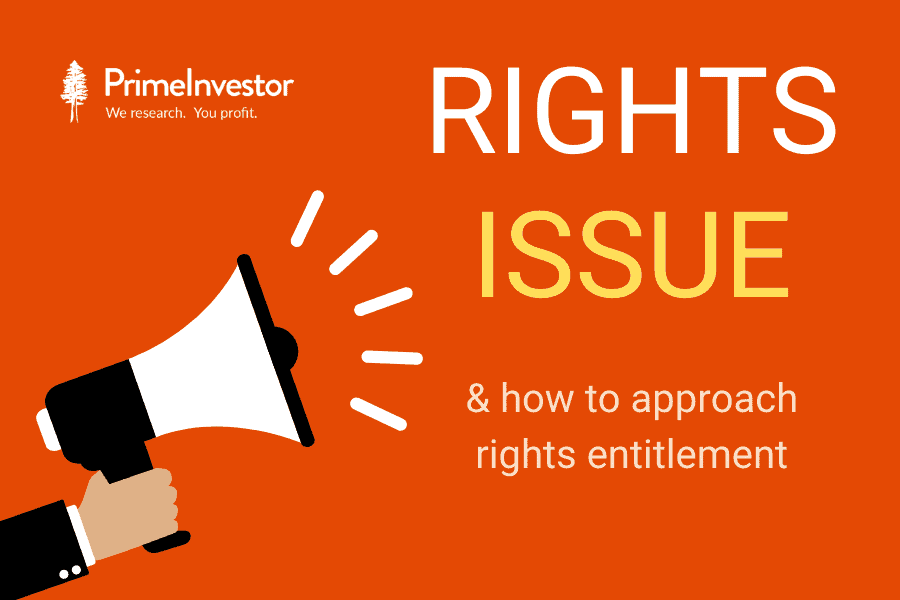The Bharti Airtel rights issue has attracted attention for its sheer size of Rs 21,000 crore, next to Reliance Industries’ rights issue size of over Rs 50,000 crore last year.
But how many of you have really utilized your rights or sold your entitlement? I am sure, as is the case with me, many of your rights lapsed. This is because we either forget to apply or sell our rights entitlements or don’t realize that not applying for the rights can result in dilution of your share price.
In this article, let us look at what you need to know about a rights issue and how to approach it. We are going to take the case of Bharti Airtel (which is a current issue) to explain it. This should not be construed as a fundamental call on the stock of Bharti Airtel. We have also considered scenarios that are not part of Bharti Airtel’s offering. This should not be interpreted as a call on trading Bharti Airtel Rights Entitlements.
This is an article for those who have entered stocks recently and are not familiar with such corporate issues and their implications on your holding.

Rights issue
When an already listed company makes a fresh issue of shares with first right to its shareholders, it is called a rights issue. It rewards the existing shareholders by issuing such rights at a discount to the current market price. Such an issue is a right and not an obligation for you – that is, you don’t have to necessarily apply for the rights issue.
Money raised from a rights issue may be used to fund projects, reduce debt or for any other corporate plans. Those companies in dire need would take the money from you in one shot while others may do so in phases (until the full money is taken, your rights shares will be separately traded as partly paid shares). Reliance Industries, for instance, had already raised sufficient funds when it came up with a rights issue last year. It sought to reward its shareholders and gradually reduce its debt at a group level. Hence, it was not in a hurry to take all the money. It proposed to take the right money in tranches over 1.5 years.
That’s a rights issue for you in a nutshell. When it comes to a rights issue, you need to be aware of the following:
- Record date: If you are a shareholder of the company on the record date, you will be entitled to the rights and you will receive what is called rights entitlement.
- Issue period: This is the period that is available for you to apply for the rights share. If you don’t, the right will lapse.
- Rights issue price: This is the price at which the rights offer is made. For example, in the case of Bharti Airtel, it is at Rs 535. This price is typically lower than the existing market price.
- Ratio: This is the number of rights entitlements you are given, for the shares you hold. For example, in the case of Bharti Airtel, you are eligible for 1 rights share for every 14 shares held. Yes, you can apply for more rights shares too subject to availability (proportionate issue/lottery). The ratio tells you the assured number of shares you will get if you apply.
- Rights Entitlement (RE): Now, this is important. Earlier, you had to fill an application to apply for your rights or renounce it in favour of another person off-market. This process was cumbersome, and many investors allowed their rights to lapse, resulting in price dilution in their holdings. To make this less painful, SEBI announced the introduction of rights entitlement (RE) in a demat, tradeable form in early 2020. This was first made available during the rights offer of Reliance Industries in May 2020. Now, if you are a shareholder, you will be credited your proportionate (ratio) RE to your demat account. REs are NOT rights shares issued. They merely give you the right to apply for rights share. With this entitlement, you can apply for the rights shares through ASBA or through the RTA online. You will be assured of the rights share to the extent of the original REs allotted. You can read all about rights entitlement in this FAQ by SEBI. You will pay either the full amount or the part amount as required by the company.
- Trading of RE: When the REs are credited to your demat account, they are available for trade (we will see this with Bharti Airtel example later) for a brief period. The idea of this is to ensure that if you don’t plan to apply for the rights issue, you can sell your entitlement in the secondary market to those who wish to buy it. So, even if you do not hold say Bharti Airtel’s shares, you can buy the entitlement from the market and apply for rights issue.
- RE trading period: This is a limited window, during the rights period, when the REs are allowed to be traded. That means, this is the period when you can sell or buy the REs in the market. No intra-day trade is allowed.
- RE trading price: This is the price at which an RE is traded in the market. Theoretically, it is the difference between the rights offer price and the rights-adjusted market price (also called intrinsic value in trade parlance for rights issues). For example, in the case of Bharti Airtel, the offer price is Rs 535, and the stock was trading at Rs 694 soon after the record date. So, the RE would theoretically be around Rs 159. But it could trade higher or lower than this (RE was Rs 208.45 on close of October 8) depending on the demand and supply of REs which in turn is determined by the markets forecast of the company’s prospects.
- Partly paid-up shares: Where a company asks you to pay the total rights value in multiple instalments, you will separately hold partly paid shares of the company (separate stock code and ISIN) until such time it is fully paid. In the case of Bharti Airtel, for example, you will need to pay Rs 133.75 (25% of issue price) during application of rights share and the rest Rs 401.25 over 2 subsequent calls that the company will make within 36 months. Until such time, it will be traded as a partly paid share, separately.
Now let us list some of the above terms we discussed for Bharti Airtel, so that we can use it later in our illustrations:
What next after Rights Entitlement?
If you are an existing shareholder and have REs credited to your demat, you have the following options:
- Apply fully or partly for the rights you are entitled to
- Apply for the rights you are entitled to plus buy more REs in the market and apply further
- Apply for a part of your rights and sell the remaining RE
- Entirely sell the RE
- Do nothing and allow the RE to lapse
Let us discuss these scenarios now.
#1 Converting REs credited to rights shares
Applying for rights is pretty simple. If you are a Bharti Airtel shareholder, it likely means you are bullish on its prospects. If so, it makes sense for you to apply for the rights issue if you had the money, since it is available at a discount to the market price (at about 25% discount on the price before record date).
#2 Buying more REs
The decision to buy more REs is a bit more complex. If you are super-bullish on the stock, then you might not only want to subscribe to the existing rights you are entitled to, but also buy more REs in the market and subscribe further, since it is at a discount.
But for this, you need to know whether the RE premium is attractive enough for you. Let us illustrate this with Bharti Airtel’s RE.
As a shareholder, some REs are already allotted to you in the ‘ratio’ stated by the company. There is no ‘premium’ you pay to acquire these REs. You simply have to use them to apply for the rights shares. But if you wish to buy more REs, you can do so before the RE trading closing date, which is October 14, 2021, in the case of Bharti Airtel.
Assuming you do buy more REs, then you need to pay a price for the RE in the market and then go ahead and pay for the rights application. The table below sumamrises the total cost of such a purchase.
The total value you pay for the rights shares is prima facie, the RE price plus application money for rights plus balance amount. You will see in the table above that the total value is seemingly higher than the current market price.
But it is not that simple. The reason is that you don’t pay the balance Rs 401 right away. You pay it later. So, the present value of such money you pay has to be taken to find out the cash outflow today. Unfortunately, we do not know when the 2 other instalments will be called for.
Let us assume two scenarios as given below (there can be any number of scenarios. We have just picked two). In both the scenarios we assume that the balance amount of Rs 401.25 is split into two equally and called.
In the above Scenario 1, you will see that the present value (arrived using the present value formula) is higher than the current market price. It seems to suggest that you are better off buying the share in the normal route than buying more of REs.
The problem is that we cannot be conclusive on this one since we do not know the dates on which the remaining amount will be called. The longer the company takes to ask for the balance the lower the present value will become. For example, if the company called for the instalments in the second and third year (see Scenario 2 above) the present value comes to Rs 698 – which is closer to the current market price.
Besides, if you assume a higher discount rate (which can represent your savings or deposit rate) of say 6% the present value goes down. In Scenario 1, this would bring the present value to Rs 700.
In essence, two key variables - call date and call amount (it's easier to fix discount rate) can change the outcome.
For want of the exact date on which the rest of the money will be called for, you can go with the very first illustration (Rs 695 current market price versus Rs 743 to buy RE and apply for rights - in the table before Scenario 1) and conclude it is cheaper to buy Bharti Airtel in the market instead of buying any ‘additional’ REs.
Please note that this illustration applies only if you are buying REs. It will not apply to the REs already credited to you for your current holding.
#3 Apply for part of your rights
This is a simple case of using a part of your REs to apply for the rights share. You may resort to this if your cash flows are curtailed. In this case, you need to make sure that you sell your unutilized REs while they are trading in the market. If you fail to, you will undergo marginal dilution in your average price (we will discuss this further below).
#4 Sell your REs
If you do not wish to subscribe to the rights whether for want of investible surplus or because of your view on the stock, it is best to sell REs (called as renouncing your rights) in the market. This is not something many of us do, simply because we forget about the offer and allow the rights to lapse.
But selling ensures that you make good some or all of the loss from the fall in price, post rights. In the next point, we will explain what is it that you lose by not subscribing to the rights and not selling your REs. You will also see an illustration on what you get by selling your REs.
#5 Allowing your RE to lapse
In March 2021, brokerage firm Zerodha said their users had lost Rs 10 crore since May 2020 (when REs started trading) due to lapsed REs. Missing an IPO does not affect your existing investments. But if you miss a rights issue, it impacts you. The impact is high or low depending on whether the rights issue is at a steep discount or marginal discount to the market price.
To understand this impact, you need to understand the concept of theoretical ex-rights price. This is nothing but the theoretical value of a stock’s price after the rights issue.
Let us take the case of Bharti Airtel's right issue to understand this - but with a modification to the terms to make it easier to explain. We are going to assume that the full value is paid up. In the illustration below you will see that if you divide the total market value post right issue, the share price is lower. This is because the rights issue is invariably done at a discount. So the post issue price has to come down.
In other words, by not applying to the rights, you are allowing your price to dilute as there is equity share capital expansion at a lower price and you did not participate in it. For example, if you sold your 1 RE (for 14 shares of Bharti Airtel you held) you would get Rs 209 (last RE traded price on Oct.8) and a post-tax value (at 15% tax) of Rs 178. On a per share basis this amounts to Rs 13 per share of gain (for 14 shares held).
Assuming your post rights price declines to the theoretical ex-rights price of Rs 685, then the net decline would be to the extent of Rs 23.6 (-36.6+13) per share or just 3.3% decline feom the price before the record date. This is not hard to recover.
Here again, please note that we have assumed the full value is paid up initially. This is not the case with Bharti Airtel as money will be taken from you in instalments.
Let’s summarize your action points here:
- You can decide to apply for a rights share based on your conviction on the company but make sure you do not forget to pay up the remaining money when it is called for. If you fail to, your shares may be forfeited, or interest charged.
- If you do not have the money to apply for the rights or do not wish to buy more, make sure you sell your REs to ensure you don’t suffer much price dilution.
- DO NOT allow your REs to lapse at any cost, especially if the rights offering is at a steep discount.
P.S This is not a fundamental call on the stock of Bharti Airtel. We do not have any recommendation on the stock. Many of the calculations are illustrative in nature and do not represent the actual scenario of Bharti Airtel’s rights issue.
The analyst holds the stock of Bharti Airtel.






4 thoughts on “Rights issue: how to approach rights entitlement”
Very relevant article. Often RE lapses due to lack of information for professionals who are engaged in their regular jobs. Is it possible to subscribe to a calendar or reminder service which can send timely information on these rights issues??
Thanks. COmpanies send mails. That is the only reminder. thanks, Vidya
Are there are tax implications of selling the Rights Entitlement?
Yes, STCG. Vidya
Comments are closed.